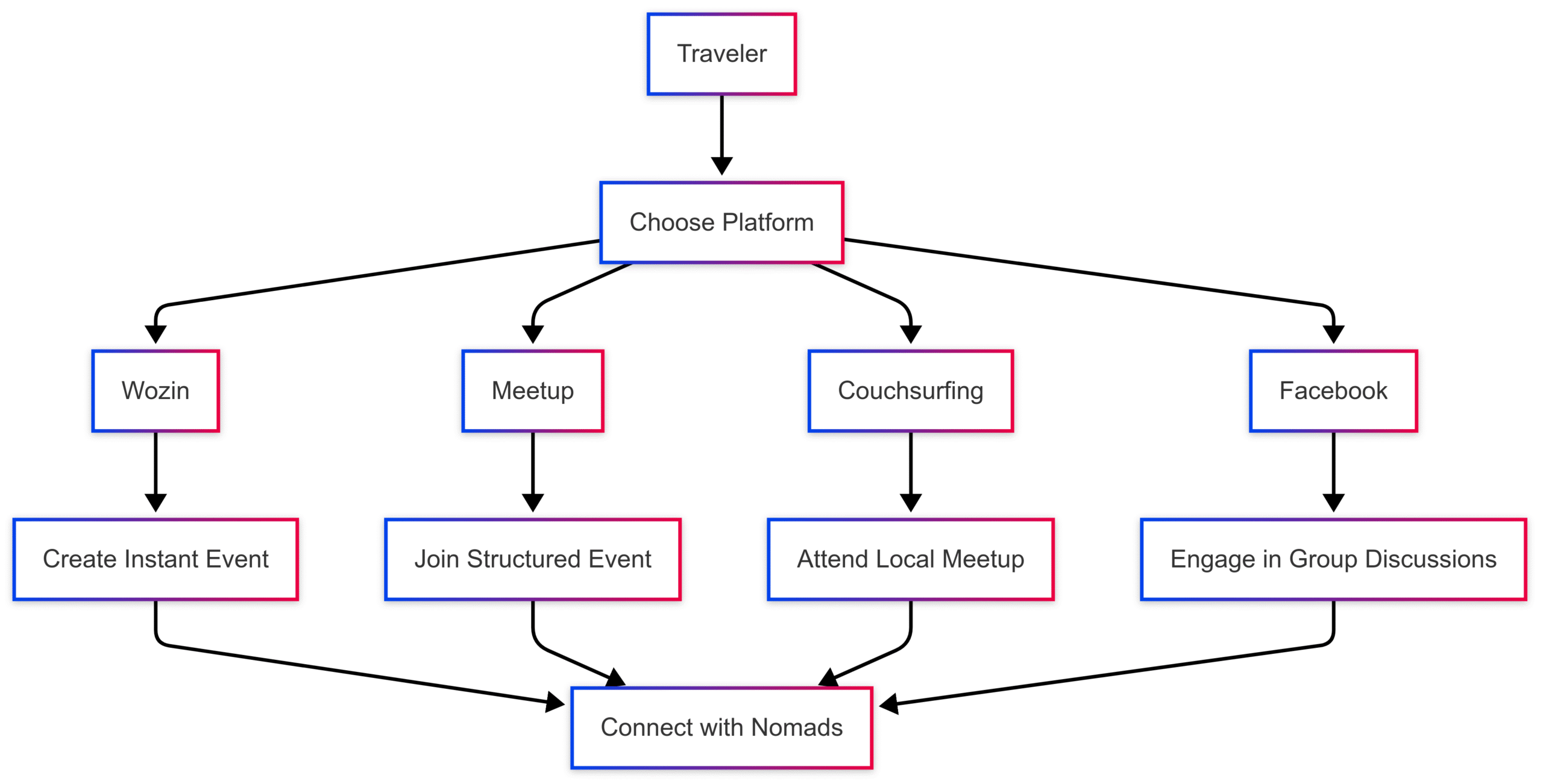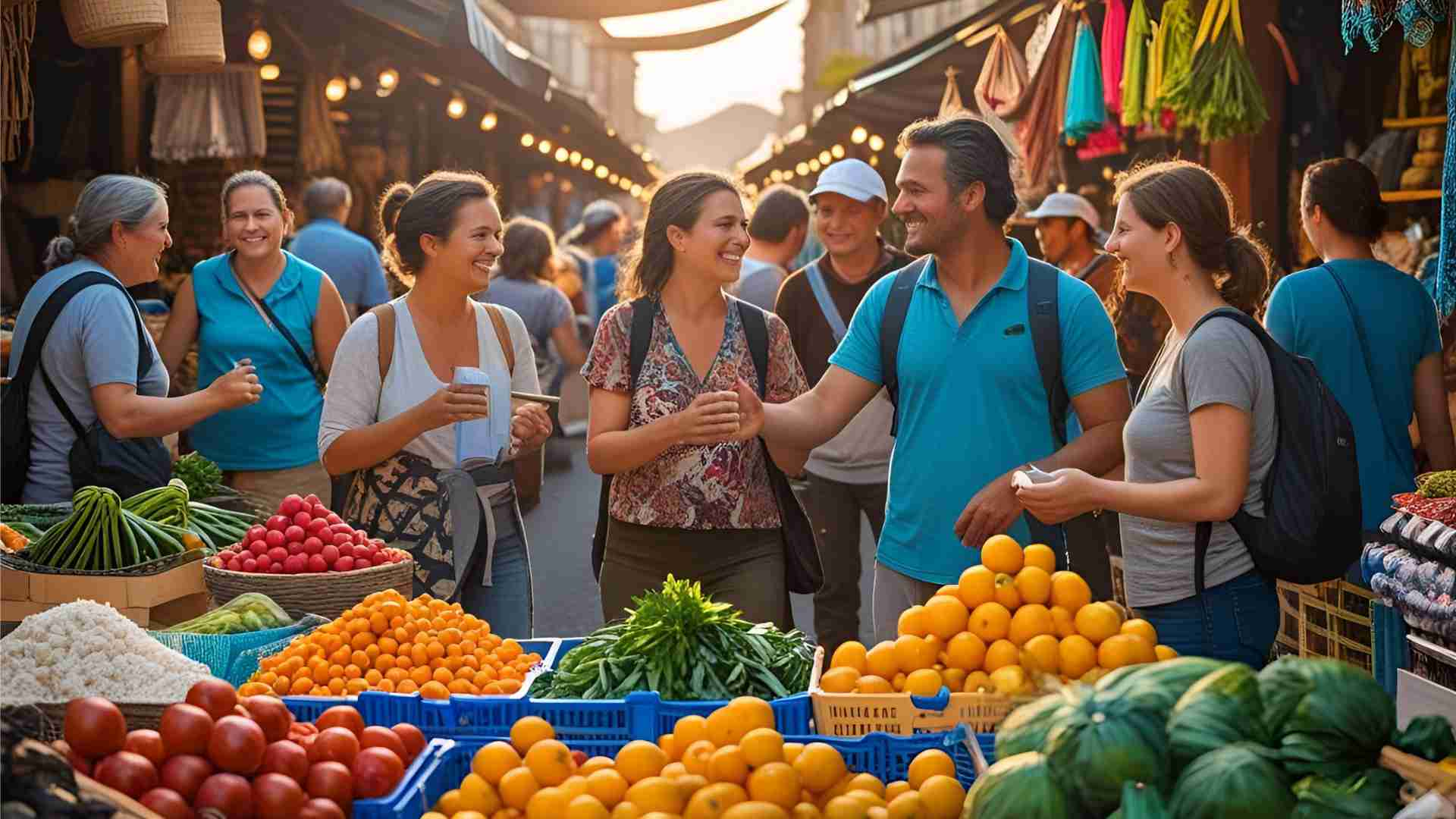Discover how to build a vibrant nomadic community while traveling. Learn tips, tools like Wozin, and strategies for meaningful connections on the go.
Traveling as a digital nomad or long-term explorer offers unparalleled freedom, but it can also bring moments of isolation. Whether you’re an introvert navigating new cultures or an extrovert seeking instant connections, building a community on your travels is essential for a fulfilling journey. This guide explores proven strategies, innovative tools like the Wozin app, and real-world insights to help you forge meaningful relationships wherever you roam. From online platforms to offline meetups, we’ll cover how to create a sense of belonging on the road, with a special focus on inclusivity for diverse travelers, including queer nomads.
Why Building Community Matters for Travelers
Traveling opens doors to new experiences, but without a sense of connection, even the most stunning destinations can feel lonely. Community provides emotional support, shared adventures, and local insights that enrich your journey. For digital nomads, who often blend work and travel, a community can also offer professional networking and collaboration opportunities. For queer travelers or introverts, finding safe, welcoming spaces is crucial to feeling at home in unfamiliar places.
Studies suggest that social connections boost mental well-being and resilience, especially during long-term travel. A 2023 survey by Nomad List found that 68% of digital nomads cited “lack of community” as a top challenge. Building a nomadic community counters this, creating a network of like-minded individuals who share your passions, values, or lifestyle.
Online Platforms: Your Digital Gateway to Community
The internet is a nomad’s best friend for finding and nurturing connections. From social media to specialized apps, online platforms make it easy to discover events, join groups, and meet travelers with similar interests.
Social Media for Nomads
Platforms like Instagram, Twitter, and TikTok are more than just photo-sharing tools—they’re vibrant spaces for connecting with fellow travelers. Hashtags like #DigitalNomad, #VanLife, or #QueerTravel can lead you to communities sharing tips, meetups, and stories. For example, Instagram’s travel communities often post about local events or coworking spaces, while Twitter’s real-time conversations can help you find last-minute meetups.
Facebook groups are particularly powerful. Groups like “Digital Nomads Around the World” or “Queer Nomads” have thousands of members sharing advice and organizing gatherings. These groups are ideal for introverts, as you can engage at your own pace before meeting in person.
Specialized Websites and Apps
- Couchsurfing.org: Beyond free accommodation, Couchsurfing hosts local events where travelers and locals mingle. Its community-driven ethos fosters authentic connections, especially for queer nomads seeking inclusive spaces.
- RVillage.com: Tailored for RVers, this platform connects you with fellow campers at nearby RV parks, perfect for road-tripping nomads.
- Meetup.com: Find local events based on your interests, from yoga retreats to tech meetups. Meetup’s structured events suit introverts who prefer organized settings.
- Wozin App: A game-changer for instant meetups, Wozin lets you create or join events in seconds. Founded by Daniel, a digital nomad, Wozin is designed for travelers seeking spontaneous connections. Whether it’s surfing in Bali or sunset drinks in Tarifa, Wozin’s simplicity makes it ideal for nomads.
Wozin: The App for Instant Community
Wozin, slang for “Who’s in?”, is an innovative app that bridges the gap between online and offline connections. Unlike Meetup, which can be complex and costly for community builders, or Facebook, where events often lack spontaneity, Wozin focuses on instant event creation. Daniel, a software developer and nomad, launched Wozin in 2020 after realizing the need for a platform that connects people through shared activities.
Here’s how Wozin works:
- Create an Event: Specify what you want to do (e.g., hiking, board games), where to meet, and when.
- Find Like-Minded People: Invite others or join existing events based on your passions.
- Build Community: Organic growth happens as users invite friends, creating tight-knit groups.
Wozin’s success in places like Bali and Tarifa, Spain, highlights its appeal. In Tarifa, a community of over 500 people has formed, organizing everything from beach volleyball to birthday parties. The app’s global reach makes it accessible anywhere, and its ambassador program encourages users to start communities in new destinations.
Table 1: Comparison of Community-Building Platforms
| Platform | Key Features | Best For | Cost |
|---|---|---|---|
| Wozin | Instant event creation, global reach | Spontaneous meetups, nomads | Free, rewards organizers |
| Meetup | Structured events, diverse groups | Organized activities | Free to join, paid for organizers |
| Couchsurfing | Free stays, local events | Budget travelers, cultural exchange | Free |
| Facebook Groups | Large communities, discussion forums | Introverts, niche interests | Free |

Figure 1: Flowchart of Connecting via Online Platforms
Offline Strategies: Real-World Connections
While online tools lay the groundwork, offline activities bring communities to life. Hostels, coliving spaces, and local events offer opportunities to meet people face-to-face, fostering deeper bonds.
Hostels: Social Hubs for Travelers
Hostels are more than budget accommodations—they’re social epicenters where travelers swap stories and form friendships. Common areas like kitchens or lounges encourage interaction, making it easy to strike up conversations. For introverts, hostels’ casual vibe reduces pressure, while group activities like pub crawls or game nights spark connections.
Coliving Spaces: Collaboration and Community
Coliving spaces combine accommodation with coworking, attracting digital nomads who value collaboration. Companies like Hacker Paradise, Remote Year, and WiFi Tribe organize trips with social programming, ensuring a ready-made community. Lauren Smith, a queer nomad, found a “family” through Hacker Paradise in Brazil, where shared values like freedom and exploration fostered inclusivity.
Volunteering: Meaningful Engagement
Volunteering connects you with locals and fellow travelers while giving back. Whether it’s teaching English or helping at a community farm, shared goals create strong bonds. Platforms like Workaway and WWOOF match volunteers with projects worldwide, offering cultural immersion and community.
Tours and Activities: Shared Adventures
Joining tours, day trips, or classes introduces you to travelers and locals with similar interests. Cooking classes, hiking tours, or yoga retreats provide natural conversation starters. For queer nomads, seeking LGBTQ2S+-friendly tours ensures a safe, welcoming environment.
Events and Conferences: Networking Opportunities
Digital nomad conferences like Nomad Summit or local meetups attract like-minded individuals. These events blend professional and social networking, ideal for building long-term connections. In Tarifa, Wozin users organize regular events, from sports to sunset drinks, creating a vibrant community.
Tips for Building Meaningful Connections
Forging connections requires intention and openness. Here are practical tips to thrive as a community builder:
- Be Approachable: Smile, make eye contact, and show genuine interest. Small gestures like offering to share a meal can spark friendships.
- Initiate Conversations: Ask open-ended questions about someone’s travels or passions. Sharing your own stories, as Cesar Arrocha did in Brazil, can break the ice.
- Embrace New Experiences: Step out of your comfort zone by trying local activities or cuisines. Kenny Young’s museum tours with Grindr contacts show how diverse experiences foster bonds.
- Learn Basic Local Phrases: Even simple greetings in the local language signal respect and open doors to connections.
- Engage Actively: Join clubs, volunteer, or attend events regularly to deepen ties. Consistency builds trust within a community.
- Use Apps Strategically: For queer nomads, apps like Grindr or Tinder can lead to platonic meetups, as Kenny Young found. Wozin’s group-focused events suit shy travelers, offering a low-pressure environment.
Challenges for Queer Nomads
Queer travelers face unique challenges in building community, especially in destinations with cultural or legal barriers. Cesar Arrocha’s experience in Jamaica, where homophobia forced him to hide his identity, underscores the need for caution. Researching local attitudes and laws is critical—resources like Human Dignity Trust provide insights into LGBTQ2S+ rights worldwide.
Despite challenges, queer nomads like Lauren Smith and Kenny Young find community through inclusive platforms and open-minded locals. Brazil and Argentina, for instance, surprised Arrocha with their vibrant queer scenes. Iceland, ranked highly for gay-friendliness, offers a model of inclusive culture where everyone feels welcome.
Table 2: Top LGBTQ2S+-Friendly Destinations for Nomads
| Destination | Key Features | Community Highlights |
|---|---|---|
| Iceland | Progressive laws, inclusive culture | Blended queer/straight social scenes |
| Brazil | Vibrant queer nightlife, open attitudes | Active LGBTQ2S+ communities in cities |
| Argentina | Legal same-sex marriage, proud culture | Supportive local and nomad networks |
| Poland | Emerging queer scene in Warsaw | Hidden gay bars, safety in groups |
Overcoming Introversion: Building Community as a Shy Traveler
Introverts, like the Reddit user planning a working holiday in Australia, may hesitate to connect but can thrive with the right strategies. Wozin’s group events, where no one is pressured to talk constantly, are ideal for shy travelers. Hostels and coliving spaces also offer structured settings where introverts can engage at their own pace.
Reddit users like Danger_dragon_13, a martial artist, emphasize hobbies as a connector. Joining a local gym or class provides a low-key way to meet people. Alarmed-Peace-544’s WhatsApp strategy—reconnecting with contacts when revisiting places—shows how introverts can maintain long-term ties without constant socializing.
Starting a Wozin Community from Scratch
If Wozin isn’t active in your destination, you can kickstart a community. Daniel’s approach in Tarifa and Bali offers a blueprint:
- Spread the Word In-Person: Mention Wozin at bars, coworking spaces, or events. Invite a few people to download the app.
- Post Consistently: Create 2-3 events, even if attendance is low initially. Persistence builds momentum.
- Leverage Other Platforms: Share Wozin events in local Facebook or WhatsApp groups to attract users.
- Encourage Organic Growth: Ask early users to invite friends, expanding the community naturally.
This grassroots method transformed Tarifa into a Wozin hub, proving that small actions can yield big results.
Pricing and Accessibility
Most community-building tools are free or low-cost, making them accessible to nomads on a budget. Wozin is free to use, with rewards for community organizers. Meetup charges organizers after a group reaches a certain size, while Couchsurfing and Facebook groups are free. Coliving programs like Hacker Paradise vary in cost, typically ranging from $1,500-$3,000 per month, including accommodation and events.
Conclusion: Your Nomadic Community Awaits
Building a community on your travels is a rewarding journey that blends online tools, offline adventures, and personal growth. Whether you’re surfing with Wozin users in Tarifa, volunteering in Brazil, or connecting with queer nomads in Iceland, each interaction enriches your experience. For introverts, queer travelers, or anyone seeking connection, the key is to stay open, engage intentionally, and leverage platforms like Wozin to find your tribe. Download Wozin, join a hostel event, or start a conversation today—your global community is waiting.
Please share this How do you build community on your travels? with your friends and do a comment below about your feedback.
We will meet you on next article.
Until you can read, Digital Nomad with a Baby: What to Expect as a Traveling Parent
